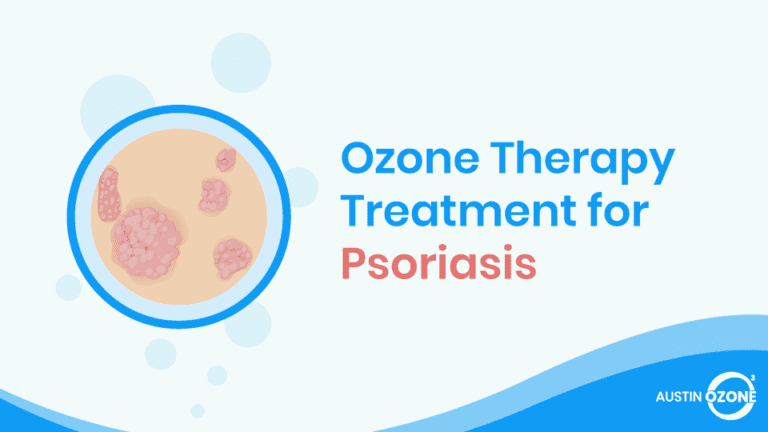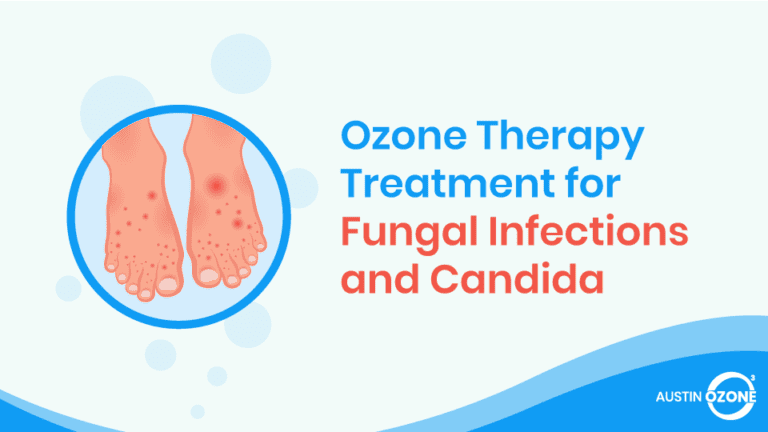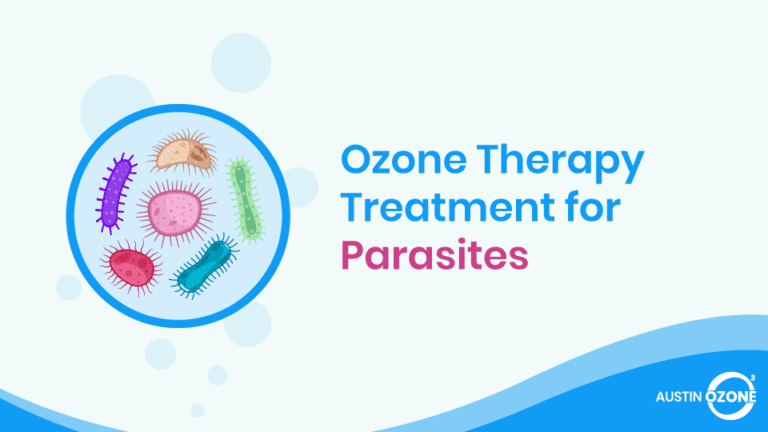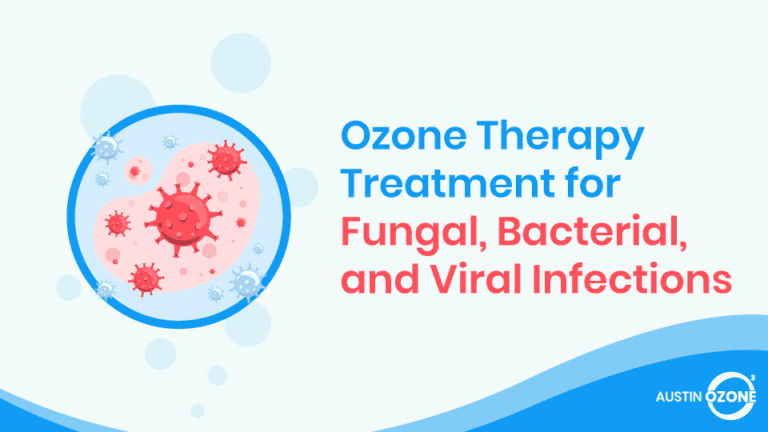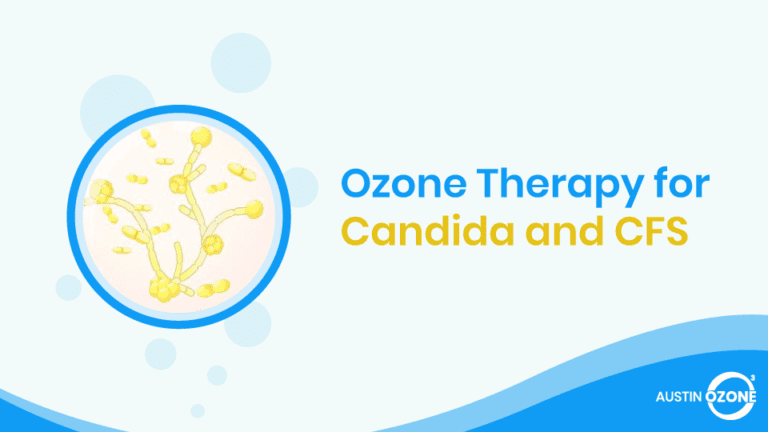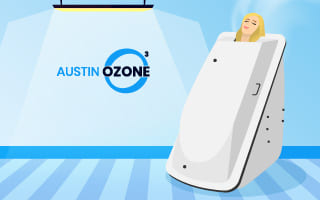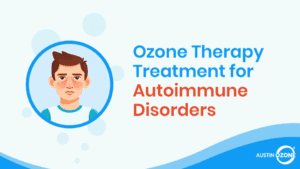Psoriasis7 is a type of skin disease caused by a dysfunction of the immune system, causing the growth of skin cells to speed up.
Under normal circumstances, the skin grows and falls off in a span of one month. However, those who suffer from psoriasis experience skin growth in just three to four days without shedding the old skin. This causes the skin cells to pile up on top of each other and develop a scaly texture. Ozone therapy for psoriasis is found to be an excellent treatment.
The piling up of skin cells can also cause inflammation, which may further lead to some serious complications. While it cannot be passed by touch or from person to person, psoriasis is hereditary.
What Causes Psoriasis?
Nobody knows the exact cause of psoriasis5. Although genetics play a role in developing psoriasis, it is entirely possible to acquire it even when no one in your family has had it. Triggers may cause a change in your immune system, which results in psoriasis.
A trigger varies from person to person. Common triggers include stress, injury to skin (i.e. bug bites, sunburns, scratches), illness or infection (i.e. strep throat), certain medications (i.e. steroids), allergies, some foods, and alcohol.
Researchers also found that some microorganisms8 are related to psoriasis. Viruses like Staphylococcus aureus, Beta-hemolytic streptococci, Candida albicans, Chlamydia psittaci, and HIV are found to increase the risk of developing psoriasis. Although psoriasis is often linked to infections, the disease is not regarded as an infection.
Types of Psoriasis
The symptoms may vary, depending on the type of psoriasis, although it is possible to experience more than one type of psoriasis in a lifetime.
They can appear anywhere on the body, including the ears, lips, eyelids, hands, nails, and feet, and can be very itchy and painful.
Guttate Psoriasis
Often developed at an early age, guttate psoriasis appears as small, round papules on the skin. These may appear on the legs, arms, and torso. In some cases, it can also develop on the scalp, face, and ears.
Pustular Psoriasis
Those with pustular psoriasis suffer from pus-filled bumps that may be surrounded by discolored skin. While it may look frightening, it is important to note that these pustules are not contagious.
Pustular psoriasis can affect different areas of the body, depending on the sub-type. Some can be found on the palms of the hand, soles of the feet, and tips of the fingers and toes.
However, there are times that it can affect large areas of the body and can cause a series of reactions that involve fever, chills, change in heart rate, fatigue, muscle weakness, and severe itching. If this happens, you need to consult a doctor immediately.
Plaque Psoriasis
The most common type of psoriasis, it is mainly characterized by the inflamed, raised, and scaly patches (called plaques) on the skin and is often accompanied by nail psoriasis.
Plaques are often found on the elbows, torso, and knees, although they can also be found in other areas of the body. Plaque psoriasis can be triggered by certain medications, infections, stress, and alcohol or tobacco abuse.
Inverse Psoriasis
Also known as intertriginous psoriasis, this type is usually found in the folds of the skin (i.e. groin, armpit, under the breasts) where rubbing and sweating often occurs. Instead of scales, inverse psoriasis can appear as lesions that are both itchy and painful.
Skin folds are also prone to fungal infections, so treatment for this type is often in combination with those that can lower the risk of infection.
Erythrodermic Psoriasis
Although exceedingly rare, this type of psoriasis disrupts the body’s temperature and fluid balance, leading to shivering episodes, dehydration, nail changes, and edema. It can affect the whole body and can be life-threatening.
How Is Psoriasis Diagnosed?
A full physical examination is usually done to confirm whether you have psoriasis or not. In some cases, the physician might require a tissue biopsy to rule out skin infection. Other than that, there is no special test required to diagnose psoriasis.
Is There a Cure for Psoriasis?
Since the exact cause is unknown, no cure is available for psoriasis. The only thing you can do is treat its symptoms. Studies show that managing the symptoms can greatly reduce the risk of psoriasis developing into a more serious medical condition like heart disease and stroke.
There are many treatments1 available in the market. Doctors usually prescribe a combination of treatments to address the issues. The treatment plan usually depends on the size and severity of the lesion or rash, its location on the body, age, and overall health.
Treatments include using creams and ointments, oral pills, light therapy, and ozone therapy. Among these treatments, Ozone Therapy for Psoriasis is very popular.
Schedule an Ozone Therapy Session Today!
What Is Ozone Therapy?
Since the mid-nineteenth century9, scientists have been actively exploring the therapeutic and medicinal properties of ozone. Ozone is an inorganic molecule composed of three oxygen atoms chemically bonded together.
Because of its powerful oxidizing properties, several studies claim that ozone is an effective disinfectant that is capable of preventing bacterial, viral, and fungal growth.
Medical ozone is produced by passing pure oxygen gas through an ozone generator. The resulting ozone can either be in gaseous or liquid form, depending on the intended application. Although ozone has many industrial and medical applications, people need to be extremely careful when using this product as it can be fatal when inhaled.
There are various ways by which ozone can be administered to the body. Its administration can be topical, intramuscular, intravenous, or through insufflation.
Ozone therapy is found to be an excellent ally in treating skin problems like acne, herpes, eczema, and psoriasis.
While there are portable ozone generators that people can use at home, most still prefer to go to certified clinics and hospitals to undergo ozone therapy since there are qualified professionals who can expertly administer ozone in those places.
Aside from its disinfecting properties, ozone therapy is found to be an excellent ally in treating skin problems like acne, herpes, eczema, and psoriasis.
Ozone Therapy for Psoriasis
In Europe9, ozone therapy is extensively used by dermatologists to treat different skin problems and diseases. Other countries also use ozone therapy to treat wounds and infections by limiting the harmful effects of viruses, bacteria, yeast, fungi, and protozoa. Other applications include using it as support treatment for illnesses that have no direct cure like diabetes, cardiovascular diseases, and psoriasis.
Benefits of Using Ozone Therapy for Psoriasis
One of the great things about ozone therapy is that it’s non-invasive. Unlike other skin treatments that only tend to hide the symptoms, ozone therapy goes to the root of the problem. For psoriasis, ozone therapy helps strengthen the immune system and eliminate the possible causes of autoimmunity.
Since ozone is a strong oxidizer, it can effectively kill pathogens, increase blood circulation, decrease inflammation, regulate the immune system, and boost the body’s production of antioxidants.
For psoriasis, ozone therapy helps strengthen the immune system and eliminate the possible causes of autoimmunity.
Medical ozone can be administered through topical treatments, injections, insufflations, and blood infusion. The treatment plan depends on the severity of the psoriasis.
A study6 on children with psoriasis showed that those who underwent ozone therapy experienced 20% healing from skin erosion and 80% reduction in skin exudation. Medical ozone can also help attenuate the inflammatory reactions and the activation of psoriasis by inhibiting the disease’s signaling pathway.
Summary
Psoriasis is a chronic skin disease caused by a malfunctioning immune system, which in turn causes the skin cells to grow so fast that it leaves the old skin no time to shed properly. This causes the skin to develop plaques, pustules, and lesions that may or may not be itchy and painful to touch.
Since the exact cause of the disease is unknown, finding a cure is not yet possible. The next best thing to do is to treat its symptoms.
The treatment for psoriasis can vary, depending on its severity and location. One of the safer, less toxic, and more effective options is ozone therapy.
Ozone therapy directly addresses the root cause of psoriasis -- misfiring immune system -- and corrects it through regulation and oxidation. It can also help improve the healing rate of psoriasis lesions and reduce the appearance of scaly skin.
Ozone therapy directly addresses the root cause of psoriasis — misfiring immune system — and corrects it through regulation and oxidation. It can also help improve the healing rate of psoriasis lesions and reduce the appearance of scaly skin.
Although current studies focus more on the benefits of the topical application of ozone theraphy on psoriasis, it wouldn’t take long for researchers to find out the efficacy of other methods of ozone application in psoriasis treatment.
If you have psoriasis, you can start consulting your doctor on which ozone therapy you should try to help you combat this disease.
Schedule an Appointment Today
References
- Evstigneeva, I. S., Kulikov, A. G., Yarustovskaya, O. V., Shakhova, A. S., & Lutoshkina, M. G. (2018). Physical therapy of psoriasis. The modern methodological approaches. Vopr Kurortol Fizioter Lech Fiz Kult, 95(1), 53-58. doi: 10.17116/kurort201895153-58
- Gao, L., Dou, J., Zhang, B., Zeng, J., Cheng, Q., Lei, L.. Tan, L., Zeng, Q., Ding, S., Guo, A., Cheng, H., Yang, C., Luo, Z., & Lu, J. (2020). Ozone therapy promotes the differentiation of basal keratinocytes via increasing Tp63‐mediated transcription of KRT10 to improve psoriasis. Journal of Cellular and Molecular Medicine, 24(8), 4819–4829. doi: 10.1111/jcmm.15160
- Integrative Wellness NY. (n.d.). OZONE THERAPY FOR ACNE SCARS, STRETCH MARKS IN BROOKLYN NY. Retrieved from http://integrativewellnessny.com/ozone-therapy-for-acne-scars-stretch-marks-in-brooklyn-ny/
- Lu, J., Ding, S., Tang, Z., Tong, X., Dou, J. Gao, L., & Zeng, J. (2020, March 4). Ozone autohemotherapy elevates PPAR-γ expression to lower blood lipid in treatment for psoriasis. doi: 10.21203/rs.3.rs-15936/v1
- Pyper, L. (2015, November 16). The effects of ozone therapy on psoriasis. Retrieved from https://salvagente.co.za/ozone-saunas/the-effects-of-ozone-therapy-on-psoriasis/
- Qin, G., Huang, J., Pan, Y., Xiang, Y., Ou, C., Huang, J., Gao, L., & Lu, J. (2018). Topical ozone application: An innovative therapy for infantile atopic dermatitis. Journal of Central South University-Medical Sciences, 43(2), 163-167. doi: 10.11817/j.issn.1672-7347.2018.02.010
- Salus Medycyna. (n.d.). PSORIASIS. Retrieved from https://instytutozonoterapii.pl/en/psoriasis/
- Shipp, J. (2020, March 5). OZONE THERAPY FOR PSORIASIS. Retrieved from https://alivenhealthy.com/2020/03/05/ozone-therapy-for-psoriasis/
- Transparency Market Research. (n.d.). Ozone therapy in dermatology market. Retrieved from https://www.transparencymarketresearch.com/ozone-therapy-in-dermatology-market.html
- Zeng, J., Lei, L., Zeng, Q., Yao, Y., Wu, Y., Li, Q., Gao, L., Du, H., Xie, Y., Huang,, J., Tan, W., & Lu, J. (2020). Ozone Therapy Attenuates NF-κB-Mediated Local Inflammatory Response and Activation of Th17 Cells in Treatment for Psoriasis. International Journal of Biological Sciences, 16(11), 1833–1845. doi: 10.7150/ijbs.41940
